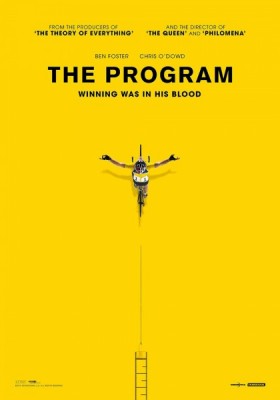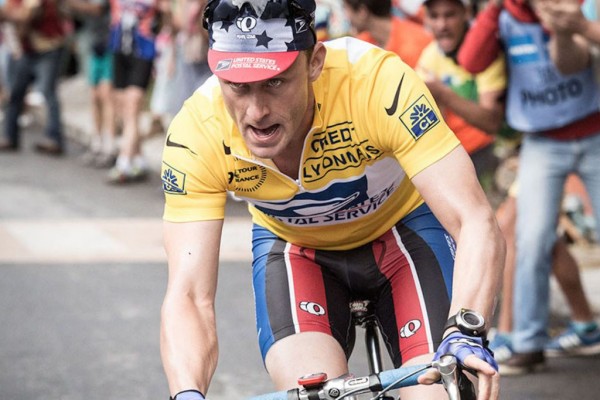The tale of Lance Armstrong’s rise and fall has been extensively documented. Now there’s a movie, and here’s Iain Treloar’s verdict.
Lance Armstrong, for a time there, was one of the most revered athletes in the world, but his fall from grace was both swift and decisive. In the wake of the explosive revelations of the US Postal doping program, there were a swathe of documentaries and books. Most of these were excellent in and of themselves, but—at least for those with a passion for cycling—it started feeling like saturation point had been reached.
The Program is the first feature-length dramatisation of Lance Armstrong’s rise and fall, directed by Stephen Frears (Academy Award-nominated for The Queen) and starring Ben Foster as Armstrong. You can watch the trailer above. It’s a flattering trailer.
The film’s scope takes in Armstrong’s decision to dope, cancer diagnosis and recovery, his seven years as Tour de France winner, retirement, return to the sport and downfall. That’s a lot of ground to cover, and at a punchy runtime of 1hr44min, the film feels a little rushed and underdeveloped.

Armstrong’s fall from grace was in part a result of his own arrogance, but also the dogged work of Irish journalist David Walsh and the testimony of Armstrong’s shunned former-teammate, Floyd Landis. These threads are both woven into the scope of The Program. The relationship of Armstrong with David Walsh (the IT Crowd’s Chris O’Dowd) is chronicled from their first meeting—an interview in the mid-‘90s—serving as the spine of the narrative (Walsh gets a screenwriting credit, and the film is based on his book Seven Deadly Sins). The compelling, wounded figure of Floyd Landis is explored in less detail.
Ben Foster’s portrayal of Armstrong is outstanding, capturing his gimlet-eyed intensity to perfection. Foster did the riding scenes, too, and shows himself a gifted mimic of Armstrong’s distinctive riding style. Indeed, Foster inhabits the character so fully that it’s easy to forget that it isn’t Armstrong himself. The gamut of Armstrong’s personality—from brooding malevolence through to easy charisma—is skillfully portrayed.
The scenes of racing action are thrillingly filmed and I found myself wishing for more of them. There was also evident care taken to get the props—frames, kits, etc—as close to period-correct as possible. However, being a bit of an obsessive, I found the instances where they got such details wrong quite jarring. The most obvious example can be seen at the start of the trailer above, where Armstrong is the recipient of some tough talk from a competitor telling him he doesn’t win in Europe. This, despite the fact that Armstrong is wearing the rainbow stripes of world champion, a result he notched up in Oslo the year before. Other smaller details—Sidi shoes instead of Nike, a glimpse of modern Shimano Tiagra gearing on a bike, an external bottom bracket—add to the frustration here. And, it must be said, many of the extras in the peloton don’t look like the lean athletes they’re supposed to be portraying.
Ultimately, the film suffers a little because it gets caught in a difficult no-man’s-land. There’s too little for cycling fans to grab onto, or it’s hamstrung by little inaccuracies as mentioned. But it’s too rushed and requires too much former knowledge for cycling novices to get the most out of it. The film is evidently pitched more for a mainstream audience than the obsessive; however, given it doesn’t seem to have received release at Village or Hoyts (I saw it as part of the British Film Festival), it’s likely to play to small crowds of bike nuts at indie cinemas, to similarly lukewarm reception.
65% — A well-performed film flawed by poor pacing.
Ride On content is editorially independent, but is supported financially by members of Bicycle Network. If you enjoy our articles and want to support the future publication of high-quality content, please consider helping out by becoming a member.


For those of us less diverted by the technical details, it is an excellent performance by both Ben Foster and Chris O’Dowd, with Armstrong’s character and motivations well drawn. I thought it was well worth watching as a story of human frailty and self-deception. It also illustrated quite well the pressure on the cycling industry to let little lies go, until it became the big lie, too big to fail!